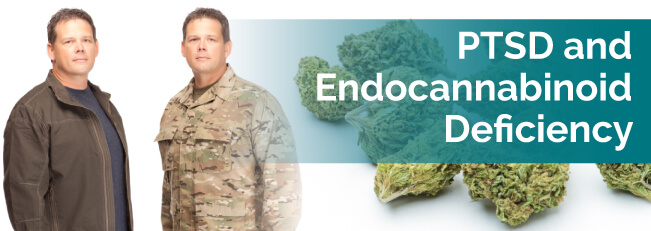
Post-traumatic stress disorder is a condition caused by a traumatic experience that starts to haunt a person’s everyday life. Stress and anxiety are common reactions to severe psychological shock, but usually, people mend naturally. The inability to bounce back and recover after a terrifying experience is what characterizes PTSD.
For decades, people with PTSD have been using pot to self-medicate. Users have professed time and time again that the herb calms their anxiety and helps them forget their unwanted memories. For years these claims have been written off, and PTSD users of marijuana have been labeled pot-heads.
However, recent studies show that their claims are rooted in actual science. PTSD could be caused by an imbalance in our body’s endocannabinoid system, and medical marijuana has proven to be an effective treatment for many endocannabinoid-related issues. Marijuana may be the key to treating PTSD symptoms.
Symptoms associated with post-traumatic stress disorder usually develop within the first month after the inciting incident. In rare cases, they crop up years after the experience. What sets PTSD apart is that people with the condition continue to exhibit the following symptoms for more than a month and sometimes for years:
A traumatic event is what causes post-traumatic stress disorder, but the reason it persists may have a scientific explanation.
Our endocannabinoid system is made up of cannabinoid receptors throughout our body. This system is involved in many of our physiological functions, both physical and neural. Sensations of pain, mood, appetite and memory are all influenced by the endocannabinoid system. Its primary function is to maintain balance and keep us healthy. It acts as a bridge between our body and our mind. If the endocannabinoid system is out of whack, many physical or neural conditions can develop.
An endocannabinoid deficiency could be what causes PTSD. People with PTSD have low levels of a neurotransmitter known as anandamide. This messenger molecule plays a significant role in the endocannabinoid system. Anandamide binds itself to cannabinoid receptors, activating them to help people deal with pain, depression and memories.
When memories become too painful, cannabinoid receptors work to suppress them. They lower feelings of anxiety and help you forget bad or scary things. Because PTSD patients have low levels of anandamide, their endocannabinoid system is thrown off balance. Bad memories can’t be forgotten and high levels of anxiety lead to both psychological and physical symptoms.
Much like anandamides, the compounds found in cannabinoids, the active chemicals in weed, cling to our system’s cannabinoid receptors. In patients with an endocannabinoid deficiency, these marijuana cannabinoids can help patients regain balance.
Two cannabinoids found in medical marijuana activate cannabinoid receptors similar to the way anandamide does: tetrahydrocannabinol (THC) and cannabidiol (CBD), the most common compounds. They mimic our body’s cannabinoids, and if there’s an imbalance, they help regulate it. THC and CBD target the deficiencies causing a patient’s anxiety and reoccurring thoughts.
Some object to the use of THC for anxiety disorders because it’s been known to increase feelings of anxiousness. However, because of its ability to mimic anandamide, strains containing high amounts of the compound can serve as an effective treatment for PTSD patients.
If you’re looking for a strain to treat your PTSD, those with both THC and CBD are highly recommended. Even though indica is known as the calming strain, some sativa strains produce a similar effect because of their THC content and ability to activate cannabinoid receptors. Talk with a doctor to figure out the best strain for you.